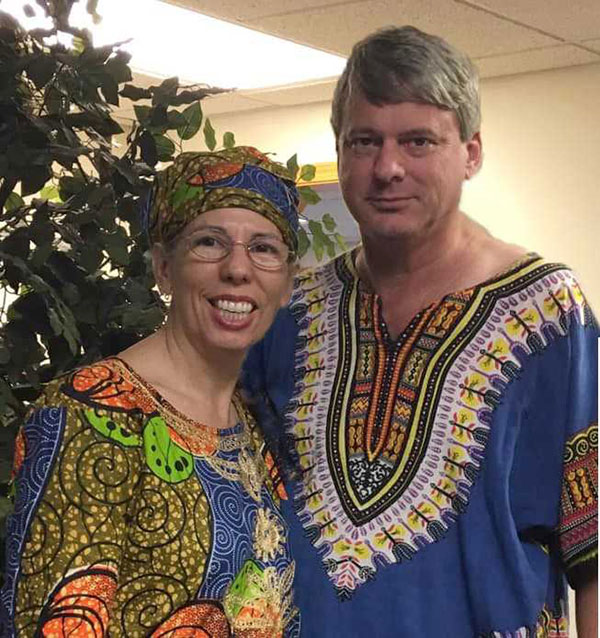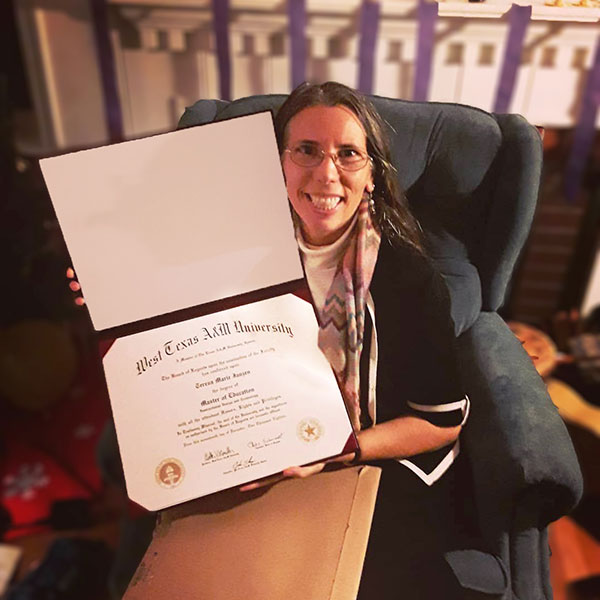- Education
- Jon Mark Beilue
'Climbing a Second Mountain'
Online master’s degree aids missionary in war-torn S. Sudan
Rare is it that a student pursuing a master’s degree doesn’t have to overcome some kind of distraction or inconvenience. This was Teresa Janzen’s:
Civil war. Threats of robbery and violence against those like her. The death of her father-in-law. Living in a 120-square foot hut. Makes something more routine like time management or child care look not quite so daunting.
“I’ve learned a lot about my own frailty and limitations,” Janzen said. “For an American who grew up to work hard and overcome obstacles, it’s hard and humbling to learn there are obstacles that can not be overcome with sheer willpower.
“Sometimes it takes the help of others and sometimes it takes divine intervention. Sometimes it takes acceptance that things don’t always go the way I think they should.”
Janzen described the challenge of living and working in war-torn South Sudan in East-Central Africa, but within that was a 2 ½-year pursuit online of her master’s degree from West Texas A&M University in education with a specialty in instructional design and technology.
For Dr. Richard Rose, Program Chair of that department, those pursuing a master’s under his supervision often don’t fit the traditional graduate student. They’re often in their late 30s and early 40s, and even into their 50s and 60s.
“It’s a highly eclectic student body,” Rose said. “They are doing what (best-selling author) David Brooks refers to as ‘climbing the second mountain.’ They’re already successful in life and now they want to do something more meaningful, more personal, more satisfying beyond just making a living.”
 For Janzen, she and husband Dan – the second marriage for each – are missionaries that for Teresa fulfills a calling she had when she was 16 in 1983. The path has been winding and long as they didn’t arrive in South Sudan until 2016.
For Janzen, she and husband Dan – the second marriage for each – are missionaries that for Teresa fulfills a calling she had when she was 16 in 1983. The path has been winding and long as they didn’t arrive in South Sudan until 2016.
In between was a previous marriage, four children and a successful career.
“Leaving my family, my job and my home was one of the hardest things I’ve ever done,” she said, “but I don’t regret it at all.”
South Sudan is racked by civil war and poverty. When the Janzens arrived in one of the villages in the country of 12 million in 2016, it was primarily to reopen a secondary school that closed due to communal violence. That was also the year that Teresa believed she needed to pursue a master’s degree.
A native of western Michigan, she finished her undergraduate degree after a 25-year break at Kuyper College in Grand Rapids, Mich., in 2007. She was looking for an affordable master’s program that was obviously 100 percent online with what she believed was useable real-world skills.
She found it with WTAMU and Richard Rose.
In the meantime, the U.S. funder for the school cut ties. It wasn’t long before the Janzens found themselves with ACROSS, an international interdenominational Christian organization.
They moved to the capital city of Juba, called “the world’s largest village,” and one of the least developed capital cities in the world. Paved roads are few in the city of 450,000. Power comes from a generator. Water comes from a well pumped into a tank.
Home is 120 square feet with a shared kitchen, with running water though not drinkable. Government officials can search their hut, their person, the vehicle at any time. Photos are not allowed in public. No one can be outside after sunset.
The Janzens lead programs in not only Juba, but in Kapoeta East, a sparsely populated dry area in southeast South Sudan, and occasionally into Uganda.
Through a Christ-centered holistic approach, ACROSS partners with United Nations agencies with 30 projects in 18 locations. It has nutrition and education programs, agriculture programs of which Dan specializes, emergency response that delivers medical supplies as well as pastor training and sports ministry.
Nearly all South Sudanese, Janzen said, have little education and are subsistence farmers. Many are displaced in urban areas. Inflation is in triple digits for those who even have money. People die from hunger and for lack of medicine that costs only a few dollars. Crime is on the rise, especially extortion and road ambushes, for money.
“Some days are fulfilling and some days are just frustrating,” she said. “It’s not about fulfillment for me, though it’s nice when it comes. It’s about obedience.
“There are no quick solutions to what is happening in this country. You relish the small victories when they come and trust that you are part of a larger whole that will someday make a difference.”
Janzen has found that her master’s degree from WTAMU has made a difference. Since it’s an MEd, it gave her added credibility with the Sudanese, who despite the poverty, value academic credentials.
She uses skills learned through WTAMU in communications and organizational development that includes a social media platform, revamping the website and marketing materials. She’s much more advanced in computer software as well.
“The mountain she is trying to climb is a very difficult one,” Rose said. “There are many cross currents people like Teresa have to navigate. But she is the consummate professional and she can handle it all.”
Janzen has never been to Canyon or met Rose – “yet,” she said. The husband and wife of nearly 15 years return to the U.S. every 18 to 24 months.
Janzen finished her master’s in December. While they were in the U.S. in late December/early January, a package arrived at her mother’s home. It had a Canyon, Texas return address. It was her diploma.
“It was enormous,” she said. “I was thrilled.”
Do you know of a student, faculty member, project, an alumnus or any other story idea for “WT: The Heart and Soul of the Texas Panhandle?” If so, email Jon Mark Beilue at jbeilue@wtamu.edu.

